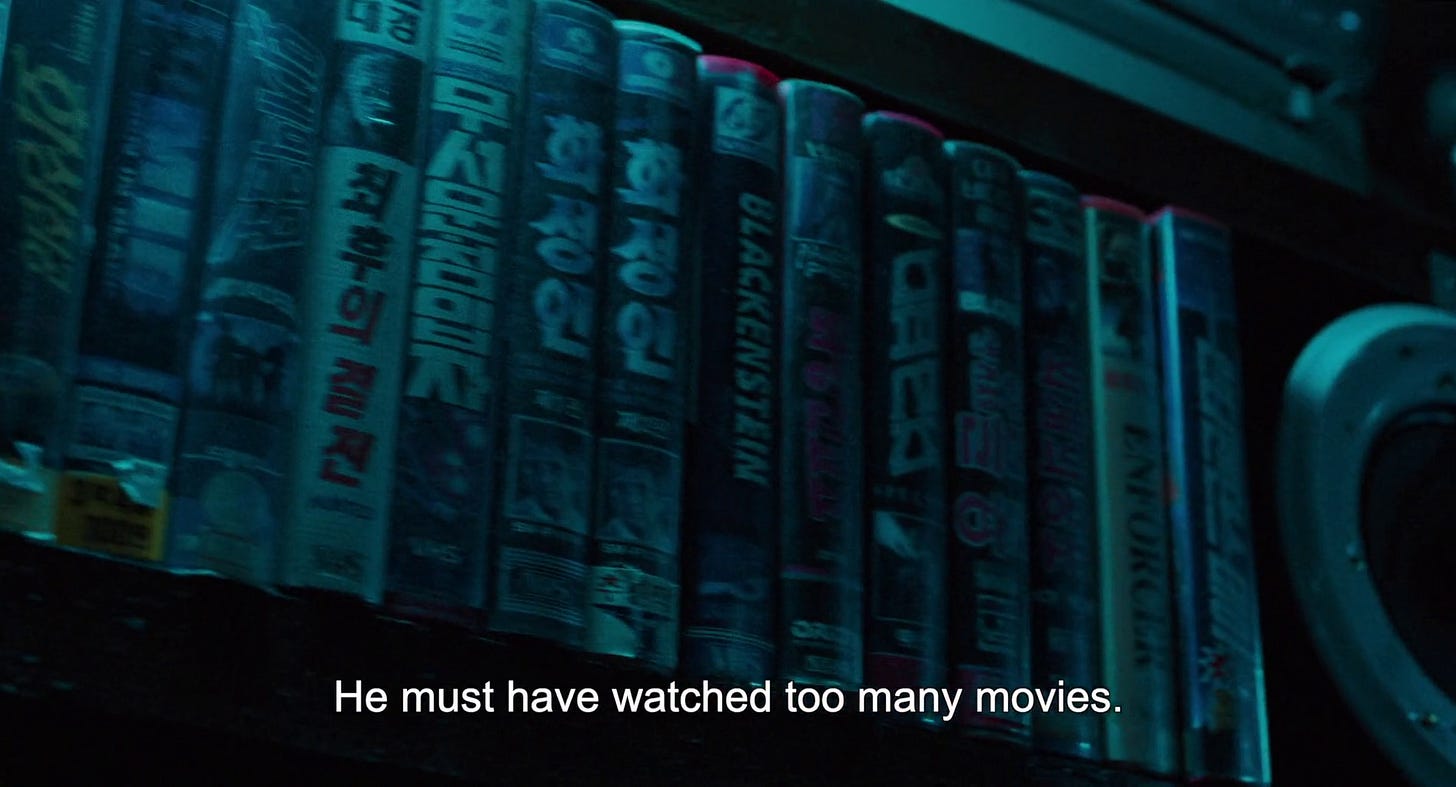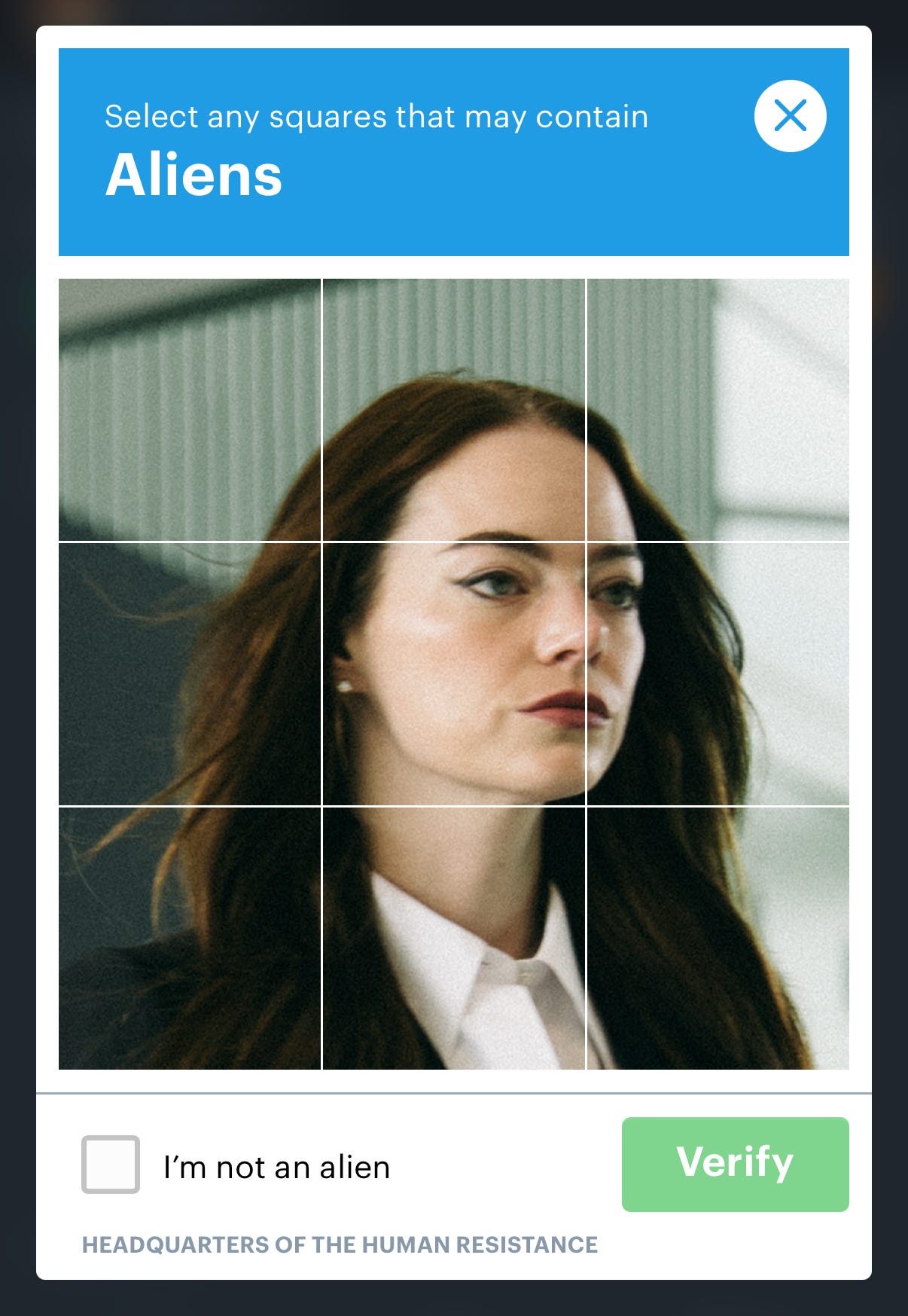Issue #404: Bugonia and the Truth of Every Alien Conspiracy Theory You've Ever Heard
Songs that have complex narratives face a lot of challenges to being good songs. This is no clearer than in this week’s Music League playlist, which I hated.
There have been mixed reviews, but this one was not for me. Feels like we lost the sauce at the end. I wrote about Slick Rick a couple newsletters ago. More than anything, this playlist made me confused about why someone named “Scientifik” is the credited artist for every song on the This Is Boston Not L.A. (1982) comp. Anybody got any lore on that?
The song from the comp, “Broken Bones” by The Freeze, was definitely my favorite. It has a distinctive story but also a singable chorus. It overcomes the structural barriers that a narrative song might face.
I locked in my submission pretty early, but I almost had this on the playlist:
Not sure this would have done too well among our group, but damn it’s good.
Next league will start on the 19th and you can join here: https://app.musicleague.com/l/5fd55cb72716473faec1a5715699d91f/
Hope to see you on the standings.
Conspiracies and Bodies of Proof in Yorgos Lanthimos’s Bugonia
If the shoe doesn’t fit…
In Yorgos Lanthimos’s “R.M.F. Is Flying,” one of the three segments of his film Kinds of Kindness (2024), Jesse Plemons and Emma Stone star opposite each other as Daniel and Liz. Liz is a marine biologist who has disappeared seemingly without a trace, and Daniel is her husband mourning her disappearance. Liz ostensibly returns, but Daniel is suspicious. Like an inversion of the facts of the Frédéric Bourdin/Nicholas Patrick Barclay case depicted in The Imposter (2012) and the Law & Order: SVU episode “Stranger” (2009), Daniel believes the person who appears to be Liz is someone else based on strange, specific incongruities between her behavior and the behavior of the Liz he remembers.
There are other strange details that stoke what appears to be a delusion on Daniel’s part, like a difference in his returned wife’s feet. The allusion to Cinderella is potent here — another narrative reversal — with Liz disqualified as herself because her shoes don’t fit1.
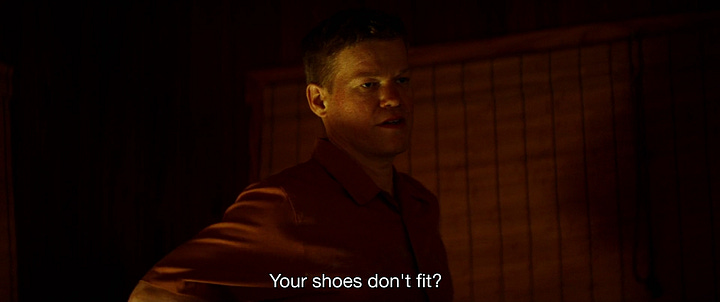
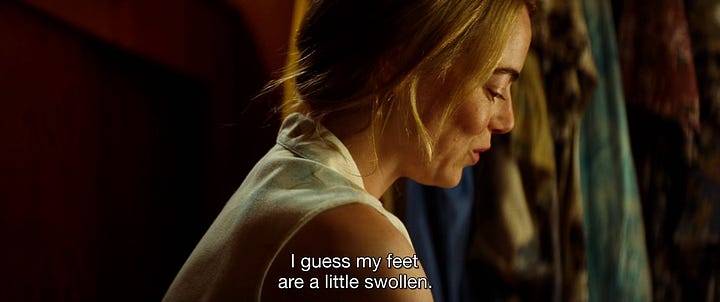
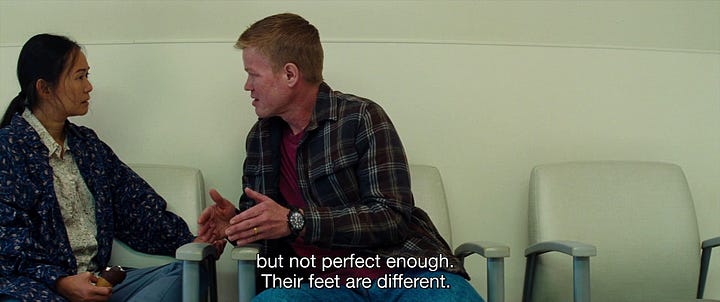
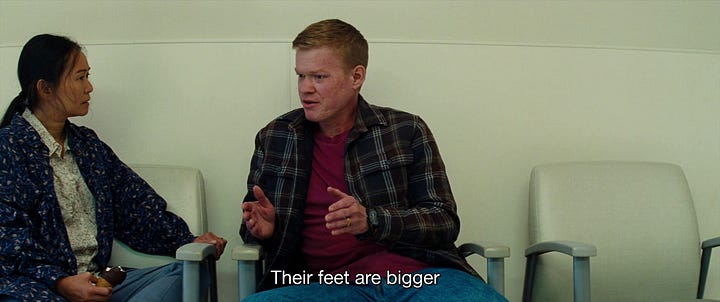
Daniel makes more extreme and unusual demands of Liz, adding to the sense that his beliefs about Liz not being who she appears are delusional. However, the final turn of this part of the film is the return of the real Liz. Daniel was right. The Liz that he torments, with the different feet, is not the wife who disappeared.
This plot should resonate as at least moderately familiar to those familiar with Lanthimos’s new film, Bugonia (2025). Plemons and Stone star opposite each other again, this time as Teddy and corporate CEO Michelle Fuller. Teddy suspects Michelle of being an alien, an obvious delusion when evaluated with the assumptions of non-cinematic reality in place. However, those who have seen Kinds of Kindness might think back to the humiliated and gaslit Daniel who really knew better all along. Is there more going on with Michelle than it initially appears? Does Lanthimos set out his analogue for the reptilian conspiracy theory to be affirmed as fact in Bugonia?
Reason, Randomness, and Popper
It will be impossible to continue to read the film without spoilers, but I’ll do my best to be coy. It is at least somewhat ambiguous by the film’s end whether Michelle is or is not an alien, as Teddy suspects. But his complex cosmology for the infiltrating Andromedans occasions questions in the film unrelated to the facts of Michelle’s biology. Whether his suspicions are correct or incorrect, Teddy’s resentment of Michelle is driven by his very personal encounter with the easily explainable capitalist imperatives of her business. In fact, Teddy is uniquely positioned to administer a critique of Michelle, not because of what he knows about her alien (or not) origin, but because of what he knows about her business practices.
A wide variety of philosophical traditions can give shape to Teddy’s defiance of Occam’s razor. In both Bugonia and Kinds of Kindness, Daniel and Teddy appear to hold an erroneous or delusional belief according to the plot’s own logic. The critical differentiator between these characters’ position and other cinematic examples of so-called gaslighting, such as the long chain of horror examples beginning with Rosemary’s Baby (1968), is the lack of dramatic irony. In most horror films, the audience sees the supernatural encounter that other characters interpret as delusion. In the Lanthimos examples, the audience has reason to doubt the veracity of what Daniel and Teddy claim.
What is radical about Lanthimos’s films, though, comes from their ostensible realism. Without an obvious supernatural plot, the audience should think that Daniel and Teddy are wrong about their ‘captives.’ Daniel and Liz being a couple causes “R.M.F. Is Flying” to signify in the uncomfortable space of domestic abuse. By contrast, Teddy’s violence toward Michelle is de-sexualized as a result of Teddy chemically castrating himself. Additionally, his hostility toward Michelle has some measure of justification insofar as he reflects the cultural logic that valorizes Luigi Mangione. Michelle is almost comically villainous as she obliges her employees to work outside of the boundaries of their prescribed working hours, superficially embraces diversity initiatives, subjects her employees to physically dangerous working environments, and causes irrevocable harm to participants in her clinical trials.
Because both films open up the possibility for a reading that embraces an erroneous belief or delusional conspiracy as true, one should read them as a critique of Enlightenment rationality. Karl Popper, for example, offers a paradigmatic critique of the kind of thinking Teddy displays in Bugonia:
This view of the aims of the social sciences arises, of course, from the mistaken theory that, whatever happens in society—especially happenings such as war, unemployment, poverty, shortages, which people as a rule dislike—is the result of direct design by some powerful individuals and groups. This theory is widely held; it is older even than historicism (which, as shown by its primitive theistic form, is a derivative of the conspiracy theory). In its modern forms it is, like modern historicism, and a certain modern attitude towards ‘natural laws’, a typical result of the secularization of a religious superstition. The belief in the Homeric gods whose conspiracies explain the history of the Trojan War is gone. The gods are abandoned. But their place is filled by powerful men or groups—sinister pressure groups whose wickedness is responsible for all the evils we suffer from—such as the Learned Elders of Zion, or the monopolists, or the capitalists, or the imperialists. (The Open Society and Its Enemies2 306)
Already, Popper’s view is problematic to the extent that Michelle, irrespective of her status as Andromedan or human, is responsible for severe harm to Teddy. Though it may not have been her intended outcome, the harms of capitalist exploitation and unethical medical experimentation are easily anticipated. Popper exculpates the powerful from responsibility for their harm using precisely the logic of whether something can be reasonably anticipated. In The Open Society and Its Enemies (1945), he takes a comically dim view of what one might be able to anticipate about unintended consequences of one’s actions. The unintended harms of massive wealth extraction and accumulation are well-documented.
Lanthimos, it seems, is not content with conceding anything to the Enlightenment. If Bugonia were a film focused on exposing ideological cover-ups of the brute facts of capitalist exploitation, it would treat Teddy as a buffoon devoid of class consciousness and capacity for critical thinking. Eulogizing Frederic Jameson, Slavoj Žižek writes:
It is also fashionable for today’s Leftists to reject conspiracy theories as fake, simplified solutions. We all know the cliché that conspiracy theories are the poor man’s ideology: when individuals lack the elementary cognitive mapping capabilities and resources that would enable them to locate their place within a social totality, they invent conspiracy theories that provide an ersatz mapping, explaining all the complexities of social life as the result of a hidden conspiracy. However, years ago, Jameson perspicuously noted that in today’s global capitalism, things happen that cannot be explained merely by referring to some anonymous “logic of the capital.” For example, we now know that the financial meltdown of 2008 was the result of a well-planned “conspiracy” by certain financial circles. A quick ideological-critical dismissal of conspiracy theories is thus not enough: in today’s global capitalism, we are often dealing with effective “conspiracies.”
More explicit Bugonia spoilers to follow
It would be simple enough to make a film that embraces the well-reasoned conspiracy of the realpolitik or economy while rejecting a desirous conspiracy like that of Teddy’s — there are many such films. But Lanthimos endorses the cut desire inflicts upon reason by giving Teddy every reason to be wrong about Michelle. Yet, he is right all the same. At the film’s mid-point, Michelle accuses Teddy of kidnapping her in an act of revenge for his mother’s coma after an Auxolith (Michelle’s company) clinical trial3. She attempts to divest Teddy of his sense of purpose and instead reduce his action to self-serving vengeance. But by opening the possibility that Teddy is indeed the last defense against an alien aggressor, Lanthimos’s film privileges desire over reason as that which orders social life. Reason’s inability to occasion the leap that desire inspires is why it fails to account for the forms of capitalist exploitation that resemble conspiratorial harm.
“What they are is different”
Bugonia’s embrace of the social and political function of desire should not be confused for a rejection of systematic material analysis. Lanthimos’s exploration of poverty is so shocking in its authenticity, it is almost impossible to believe he was not born and raised in the United States. Teddy bikes through a dilapidated city with Dollar General, Citi Trends, and Piggly Wiggly. He works at an Auxolith fulfillment center where the powers-that-be attempt to discourage workers’ comp claims. And in a truly inspired touch, Teddy’s mother’s clinical trial is for an opioid withdrawal drug.
Teddy and Michelle live in entirely different worlds, emphasized by everything from their mode of transportation to their geographical surroundings to how their scenes are lit. The fantastical idea of Michelle being an alien obscures the fact that she and Teddy are alien to one another. They are inextricably connected, but have no means through which to understand the existence of the other. Teddy’s exhaustive knowledge of Andromedan biology can not overcome the absoluteness of their incongruity.
The alien signs of toe length and other seemingly inconsequential physiological details seem to be the only knowledge that, for Teddy, passes muster. In his dinner conversation with Michelle, he describes the different political ideologies he has ascribed to. He says something to the effect of, “I went shopping hungry and bought the whole store.” The only thing that would satisfy his hunger is this alien conspiracy woven together from seemingly irrelevant details.
Not for nothing, Lanthimos seems to have a fixation on the foot as an indicator of difference, as Liz’s foot size and Michelle’s toe length are equally at issue in illustrating their duplicity. In Bugonia and “R.M.F. Is Flying,” Teddy and Daniel assemble irrational belief structures based on meaningless pieces of evidence. Their desire sutures together these pieces in place of reason. But this kind of structure, for Lanthimos, leads to an even more profound truth.
Weekly Reading List
Paul Cheon is really, really good at Magic: the Gathering. On Magic Arena, the slickest online version of the game, the Powered Cube event is ongoing. Powered Cube translates the popular Vintage Cube format to Arena with a few concessions. There is a lot of discussion about the format, specifically about the viability of certain two-color aggressive decks. If you would like to see just how the most consistent and winningest deck in the format works, this is a hell of a primer.
Event Calendar: Go to the Movies
Until next time.
Maybe there’s an OJ reference here, too.
Pagination is from the Princeton UP one-volume edition.
Bugonia adapts Jang Joon-hwan’s Save the Green Planet! which reinforces this dynamic. Lee Byeong-gu (Shin Ha-Kyun) not only kidnaps and tortures the film’s Michelle analogue, Kang Man-shik (Baek Yoon-sik) because of his comatose mother, he has also tortured and vivisected a number of other “Andromedans” who bullied or otherwise wronged Byeong-gu.



